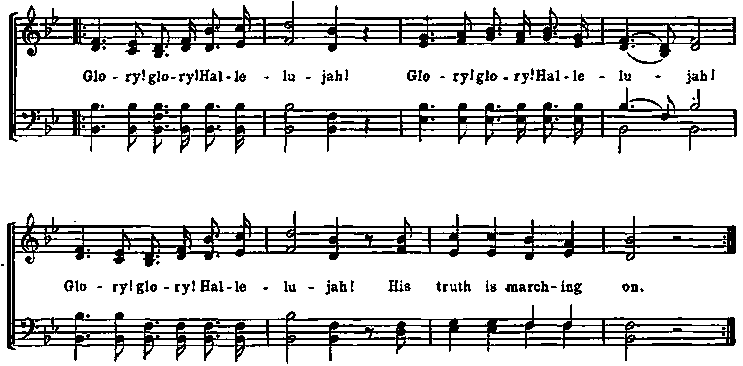Traditional Folk Songs Of Many Nations
Online songbook with lyrics & Sheet Music for 70+ songs.
| Share page | Visit Us On FB |
|
|
||
|
29 |
||
|
|
||
 |
||
|
|
||
|
"Glory Hallelujah" has had much false history written about it. One book on American music states that it arose from Foster's song of "Ellen Bayne''; another ascribes its origin to a composer of Negro Minstrel music, T. Brigham Bishop. The melody began as a Sunday-school hymn in Charles�ton, S. C. It was probably written by William Steffe, about 1856. It soon made its way into Meth�odist Hymnals under the title of "Say, Brothers will you meet us?" When the civil war began, the 12th Massachusetts regiment, then at Fort Warren, Boston Harbor, used the song as a camp ditty, making new words to its verses. Capt. Henry J. Hallgreen often had Gilmore's band play it at the fort. It was, at first, an innocent satire of John Brown, not the hero of Ossawatomie, bu* a good-humored Scotchman of the same name, who was the butt of much of the horse-play of the regiment. When the 12th Mass. regiment, under Col. Fletcher Webster, went to the front, they sang this song as they inarched through Boston and New York. It instantly became national music. In December, 1861, a visiting party of civilians were allowed by President Lincoln to visit the Union outposts in Virginia. While they were with the army a small battle took place and they saw something of actual war. As the men marched to their quarters, at the close of the combat, they sang-'John Brown's Body/' The Uev. Dr. James Freeman Clarke urged Mrs. Julia Ward Howe (both being in this party) to write some loftier poetry to the effective tune. The result was the present song. The tune is so march-like that it has become popular all over the world. The editor has heard it in Italy, in Germany and in England, and the troops of many a foreign country have marched to the singing of "Glory Hallelujah", but with the tfriginal words_"John Brown's body lies a mouldring in the grave! ' |
||
|
|
||